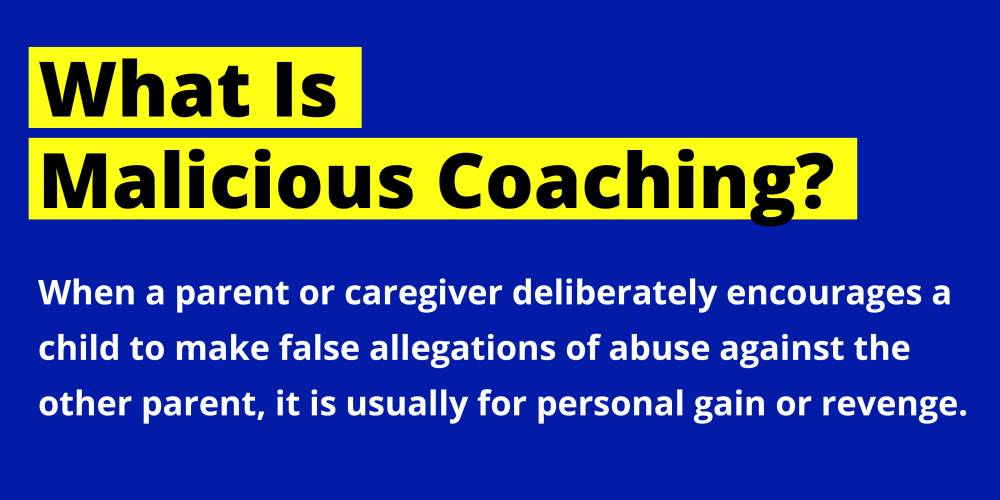What if I Suspect My Child Is Being Maliciously Coached?
 Far too often, children are dragged into a couple’s contentious divorce. One parent may even "coach" a child into saying something untrue about the other parent to get a better divorce settlement or custody agreement. This is sometimes known as "malicious coaching" and can also fall under parental alienation. Not only can malicious coaching destroy the relationship between the child and the falsely accused parent, but it can also teach children to be dishonest and manipulative.
Far too often, children are dragged into a couple’s contentious divorce. One parent may even "coach" a child into saying something untrue about the other parent to get a better divorce settlement or custody agreement. This is sometimes known as "malicious coaching" and can also fall under parental alienation. Not only can malicious coaching destroy the relationship between the child and the falsely accused parent, but it can also teach children to be dishonest and manipulative.
When malicious coaching occurs, the child's feelings of love for both parents can be harmed. If you believe your child is being maliciously coached by his or her other parent, it is essential that you relay your concerns to your St. Charles, IL, child custody lawyer. Manipulation of a child is never okay, and your attorney will know how to bring the issue to light in the best way possible.
What Is Malicious Coaching?
How can a parent tell when a child is being coached to lie about him or her by the other parent? This is hardly a straightforward issue and one that can be extremely difficult to prove. Because it is so harmful to the child and to the parent the child has been turned against, it is not a situation that can be ignored.
What is involved in malicious coaching? When a parent or caregiver deliberately encourages a child to make false allegations of abuse against the other parent, it is usually for personal gain or revenge. Perhaps the parent coaching the child wants spousal support or a bigger share of the marital assets. Or it could be entirely about the allocation of parental responsibility.
If the parent wants full custody of the child, they might encourage the child to say the other parent abused them as a way of getting what they want. Regardless of the reason, malicious coaching is a form of emotional abuse that can have long-lasting consequences for the falsely accused and for the child.
How Does a Parent Persuade a Child to Make False Statements?
Children want to please their parents, so it is not as difficult as you might think to convince a child to make false statements about a parent. The coaching parent might do the following:
- Telling the child over and over that abuse or mistreatment occurred.
- Asking the child to say complimentary things about the coaching parent or not to tell certain things that would make the parent look bad in court.
- Instead of allowing the child to be honest when answering questions asked by a social worker, psychiatrist, or other court-mandated person, the coaching parent "helps" the child form opinions that will affect the case.
- Consistently "bad-mouthing" the other parent or the professionals involved in the case to sway the child’s perceptions and feelings.
- Making the child rehearse what to say to a professional, i.e., directly telling them what to say and what not to say.
- Making the child feel guilty or "wrong" for loving his or her other parent.

How Malicious Coaching Can Hurt the Child
Despite the level of planning that often goes into coaching parents' behaviors, most professionals can see through the coaching, and a judge will not look favorably upon such behavior. The child may never forget the feeling of being caught in the middle between their parents, unable to feel safe while answering honestly. Parents and child abuse professionals should approach cases of suspected malicious coaching sensitively.
The last thing the falsely accused parent wants is to make the child feel even worse, so it is imperative that professionals be involved. Professionals will often look at the structure of the child’s statements. If those statements involve a very specific format, with the same words being used consistently, coaching is likely. If the child sounds like they are "parroting" an adult, this could mean the child is repeating what they have been told to say without really understanding the meaning.
Malicious coaching of a child to make false allegations against a parent they love is abuse and should be approached as such. Older children are generally less suggestible than younger children, although this is not always the case. Older children who desperately want to please the coaching parent may follow their lead even though they are more likely to know it is wrong.
How Will the Court Deal with Malicious Coaching?
A court may appoint a guardian ad litem to investigate the allegations of malicious coaching. The guardian ad litem will speak to the child alone and with each parent to gain an understanding of the situation. If malicious coaching is insidious and significant, a child psychologist or psychiatrist may be brought in to talk to the child. If the guardian ad litem reports to the court that a parent is engaging in malicious coaching, the court has several options.
The parent engaging in malicious coaching can be held in contempt for deliberately lying to the child and having the child repeat those lies. The penalties for contempt of court can include monetary fines, a modification of custody that alters the allocation of parental responsibilities and parenting time, and, in extreme cases, even imprisonment. In some situations, both parents and the child may be ordered to engage in reunification therapy to minimize the damage caused by the parent’s malicious coaching.
What Will the Guardian Ad Litem and Mental Health Professionals Look For?
The court will attempt to determine whether one parent’s allegations of the other’s malicious coaching are accurate. The guardian ad litem and possibly a child psychologist will look for signs of the child’s resistance to a relationship with the harmed parent. Experts in child psychology can usually recognize the signs of malicious coaching and parental alienation.
In extreme cases, a child who formerly had loving feelings for the harmed parent will now refuse to see or speak to that parent because of the other parent’s malicious coaching. The court will then examine evidence supporting the harmed parent’s claim of malicious coaching.
What Should the Parent Claiming Malicious Coaching Do?
This can be an incredibly frustrating situation. The parent who is alleging malicious coaching should collect any evidence available that proves the other parent is doing his or her best to poison the child’s mind against the harmed parent. A log should be kept to track each untrue statement made by the coaching parent or the child.
Every potentially incriminating voice message, email, text, or social media message should be preserved. Continue to try to see the child during regular parenting times. If the other parent refuses, document the effort and the refusal. Remain persistent in attempts to communicate with the child.
Contact a Kane County, IL Child Custody Lawyer
When you choose an attorney from The Law Office of Matthew M. Williams, P.C., you will benefit from the attorney’s extensive experience with troubled youth, a focus on mediation and collaborative divorce, and a goal of making the process of child custody and divorce easier and more cordial. Family law issues are already emotionally charged.
When one party attempts to complicate the process by maliciously coaching a child, the allocation of parental responsibility can become even more contentious. Choosing an Aurora, IL child custody lawyer to be a strong advocate for you and your child is one of the most crucial decisions you can make. Contact The Law Office of Matthew M. Williams, P.C. at 630-409-8184 to schedule a meeting and discuss your issues.

 630-409-8184
630-409-8184













